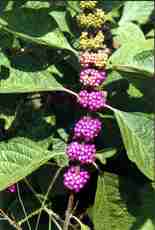|
The Feel-Good Guide to Sports, Travel, Shopping & Entertainment
|
| Main | Sports Events | Holidays & Observances | Pop Culture | Shopping | Travel |
|
Main
Pretty Shrubs May Be A Natural Way
Swatting mosquitoes and dodging other biting bugs is nearly a year-round chore in some areas, but with warm humid summer weather it seems that no place is free of biting bugs. With West Nile virus and other insect-borne diseases becoming more common, keeping the pests away has taken on new urgency. The USDA has found two common flowering bushes that grow wild and have a natural set of powerful chemicals to chase away mosquitos, ticks, fire ants, horseflies and houseflies. The American and Japanese beautyberry, a traditional folk remedy, known among people in Mississippi's hill country for at least a century, may provide some relief without all the worries of DEET and other harsh chemicals. Scientists at the United States Department of Agriculture-Agriculture Research Service housed at the National Center for Natural Products Research at the University of Mississippi have isolated compounds in the Japanese and American beautyberry plant, Callicarpa americana, that may help you avoid mosquito bites and keep other chomping insects away. “My grandfather would cut branches with the leaves still on them and crush the leaves, then he and his brothers would stick the branches between the harness and the horse to keep deerflies, horseflies and mosquitoes away,” said Charles T. Bryson, an ARS botanist in Stoneville, Miss. “I was a small child, maybe 7 or 8 years old, when he told me about the plant the first time. For almost 40 years, I've grabbed a handful of leaves, crushed them and rubbed them on my skin with the same results.”
Charles Cantrell, an ARS chemist in Oxford, and Jerry Klun, an ARS entomologist in Beltsville, Md., confirmed that the natural remedy wards off biting insects, such as ticks, ants and mosquitoes: “I've rubbed the leaves on my arms, and it works,” Cantrell said. “Traditional folklore remedies many times are found to lead nowhere following scientific research,” he continued. “The beautyberry plant and its ability to repel mosquitoes is an exception. We actually identified naturally occurring chemicals in the plant responsible for this activity." Three repellent chemicals were extracted during the 12-month study: callicarpenal, intermedeol and spathulenol. The research concluded that all three chemicals repulse mosquitoes known to transmit yellow fever and malaria. Mosquitoes carrying the West Nile virus were not tested as part of the study, but the USDA-ARS has since filed a patent application to use the callicarpenal isolated in these studies as an anthropod repellent. There are barriers, however, to producing the repellent for mass consumption. The product must be registered with the Environmental Protection Agency, which may cost millions of dollars, and a cost-effective manufacturing procedure must be determined. “It's difficult to bring a repellent onto the market,” Cantrell said. “We still have many unanswered questions: both the toxicity levels and evaporation rates are unknown. We're still in the early stages. Cantrell also said, “It's quite unusual to find a plant producing this type of compound, but it's synthesizing it for some reason. Perhaps, it's naturally defending itself against insect attack.” If you live in an area where the shrubs grow, try skipping the DEET and rub on some beautyberry the next time you plan outdoor activities. |
 Summer is mosquito season. Getting ready for a walk in the woods or a day of fun in the sun usually means rounding up the family for a good application of insect repellent.
Summer is mosquito season. Getting ready for a walk in the woods or a day of fun in the sun usually means rounding up the family for a good application of insect repellent. 
